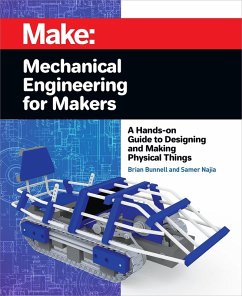
Mechanical Engineering (eBook, ePUB)
An Integrated Approach

PAYBACK Punkte
77 °P sammeln!
Mechanics is the branch of science concerned with the behavior of physical bodies when subjected to forces or displacements, and the subsequent effects of the bodies on their environment. The scientific discipline has its origins in Ancient Greece with the writings of Aristotle and Archimedes. During the early modern period, scientists such as Galileo, Kepler, and especially Newton, laid the foundation for what is now known as classical mechanics. It is a branch of classical physics that deals with particles that are either at rest or are moving with velocities significantly less than the spee...
Mechanics is the branch of science concerned with the behavior of physical bodies when subjected to forces or displacements, and the subsequent effects of the bodies on their environment. The scientific discipline has its origins in Ancient Greece with the writings of Aristotle and Archimedes. During the early modern period, scientists such as Galileo, Kepler, and especially Newton, laid the foundation for what is now known as classical mechanics. It is a branch of classical physics that deals with particles that are either at rest or are moving with velocities significantly less than the speed of light. It can also be defined as a branch of science which deals with the motion of and forces on objects. A knowledge of fluid mechanics is essential for the chemical engineer because them ajority of chemical -processing operation sarecon ducted eitherpartlyor totally in the fluid phase. Examples of such operations abound in the biochemical, chemical, energy, fermentation, materials, mining, petroleum, pharmaceuticals, polymer, and waste-processing industries. The zeroth law of thermodynamics involves some simple definitions of thermodynamic equilibrium. Thermodynamic equilibrium leads to the large scale definition of temperature, as opposed to the small scale definition related to the kinetic energy of the molecules. The first law of thermodynamics relates the various forms of kinetic and potential energy in a system to the work which a system can perform and to the transfer of heat. This book provides a basic practical introduction to engineering mechanics and is written specifically for those students who need a thorough grounding in the subject to participate fully in their engineering course.
Dieser Download kann aus rechtlichen Gründen nur mit Rechnungsadresse in A, B, BG, CY, CZ, D, DK, EW, E, FIN, F, GR, HR, H, IRL, I, LT, L, LR, M, NL, PL, P, R, S, SLO, SK ausgeliefert werden.













